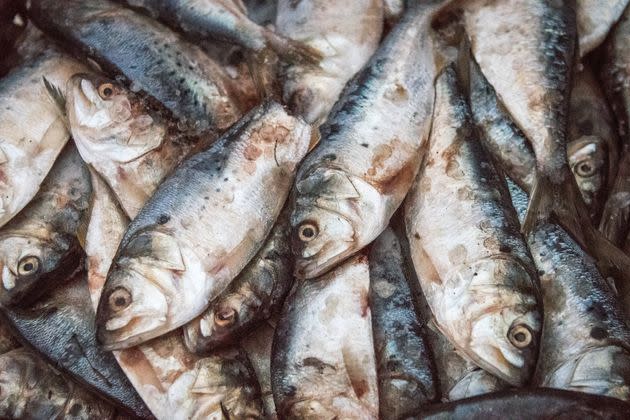Salmon-Farming Giant Faces Billion-Dollar Lawsuit
North America’s largest farmed salmon producer defrauded the U.S. government by hiding ownership of a controversial fishing fleet with a history of flouting federal authorities, according to a recently unsealed lawsuit.
The lawsuit adds a new dimension to a longstanding fight over the environmental impacts of aggressively harvesting menhaden from U.S. coastal waters. Conservationists have campaigned for years to limit menhaden fishing in the Chesapeake Bay, arguing that overharvesting the small, fatty fish too close to shore imperils marine wildlife that depends on them, including predatory fish, ospreys, bald eagles, dolphins and whales.
Many conservationists are especially concerned that dwindling menhaden stocks may be playing a role in the decline of striped bass, a species that follows menhaden migrations along the Atlantic Coast and spawns in the Chesapeake Bay. Recreational fishing for striped bass contributes roughly $8 billion annually to the U.S. gross domestic economy, according to a 2019 study by the McGraw Center for Conservation Leadership.
The complaint against Cooke Inc. and its subsidiaries and partners, filed in the Southern District of New York by two individuals on behalf of the federal government, was unsealed in April, but received little attention beyond the trade press. It asks a federal judge to levy fines that could total more than $2 billion.
Virginia is the only state on the Atlantic Coast that still allows commercial ships to net menhaden in state waters in order to process them into oil and feed — a once-common practice in the region, known as “reduction fishing.” Canada’s Cooke Inc. bought Omega Protein, the American company that has long dominated that market, in 2017. Omega Protein also fishes for menhaden in the Gulf Coast.

Federal law bars foreign ships from commercial fishing in U.S. waters. But the lawsuit accuses the two companies of conspiring to create the illusion that its ships operate as independent, American-owned vessels by transferring Omega Protein’s fleet to a shell company controlled by Cooke employees and family members who hold U.S. citizenship.
“It’s pure fraud,” the plaintiffs lawyer, Brendon DeMay, told HuffPost. “It’s totally illegal. They didn’t think anyone would find out, but we found out.”
Cooke Seafood insisted its arrangement with Omega Protein and the fishing vessels the company contracts are all legal, though the company declined to discuss the lawsuit.
“Cooke has no comment except to state that it denies any and all allegations of wrongdoing in the recently filed lawsuit,” spokesperson Joel Richardson wrote in an email to HuffPost.
A Troubled History
Reduction fishing for menhaden was once common across the Atlantic coast. But as states pushed the practice away from shore, the industry declined and consolidated. Omega Protein emerged as the last major company dedicated to the fishery on the Atlantic coast by the early 2000s. It has one other major competitor in the Gulf Coast, called Daybrook Fisheries, which is also foreign-owned.
At its height, Omega Protein operated as a publicly traded company in the United States, using the fish to produce omega-3 oil supplements and livestock feed.
But the company repeatedly ran afoul of federal law. Omega Protein pleaded guilty to Clean Water Act violations in 2013 for intentionally discharging fish waste mixed with chemicals within 3 miles of the Chesapeake Bay shoreline. The company paid $7.5 million in damages and spent three years on probation.
Three years later, a federal judge in Louisiana found Omega Protein guilty ofbreaking the Clean Water Act again — an offense that violated the terms of its probation.

When a Securities and Exchange Commission investigation into the company became public in 2017, Omega Protein’s stock tumbled.
Cooke Inc. bought the company that year, using it as an opportunity to fuel its growing farmed salmon operation by acquiring one of its main suppliers of menhaden feed.
Menhaden fishing has grown increasingly contentious in recent years. Omega Protein openly defied the harvest cap set by the Atlantic States Marine Fisheries Commission in 2019, citing “poor ocean conditions and an abundance of menhaden just inside the Bay.”
Thousands of pounds of fish washed up on Virginia’s Eastern Shore after widely publicized spills from fishing boats tied to the company. Conservationists presented Republican Gov. Glenn Youngkin with a petition bearing 11,000 signatures two years ago asking for a moratorium on menhaden fishing, without success.
An Unusual Lawsuit
Executives for both Cooke Inc. and Omega Protein knew that the American Fisheries Act’s citizenship requirement — which forbids any vessel owned or controlled by foreign citizens from commercial fishing — would bar Omega’s fleet from fishing U.S. waters, the lawsuit says.
Cooke Inc. allegedly created a holding company to skirt the requirement, installing as directors its employees Seth and Gregory Dunlop — who both hold U.S. citizenship and are directly related to Cooke CEO Glenn Cooke. Omega Protein sold its fishing vessels and the planes it uses to spot menhaden schools from the sky to the holding company. Omega Protein then contracted itself as the sole buyer of the fleet’s harvest, the complaint says.
Neither director of the company that owns the fishing fleet ― which is now called Ocean Harvesters, and is a subsidiary of Ocean Fleet Services ― can sell his interest in the company without the consent of the other, unless he sells to a direct relative of the Cooke CEO, the lawsuit says. Cooke Inc., Omega Protein, and Ocean Fleet Services all share the same address in Suffolk.
“The sole purpose of this circuitous approach was to facilitate false certifications of compliance with the AFA Citizenship Requirement and to facilitate a scheme to fraudulently induce the Government into allowing Defendants to take fish from U.S. waters,” the lawsuit says.
That new structure was designed to trick federal regulators into thinking that those operating the fishing fleet and spotter planes worked as independent contractors who would demand a fair price for the fish they netted, according to the lawsuit. Instead, Cooke Inc.’s acquisition of Omega Protein allowed the Canadian company to lower costs for its salmon feed.
Despite its well-known ties to the Canadian seafood giant, each of the ships under Ocean Fleet Services’ control certified each year to two federal agencies — the U.S. Coast Guard and the Department of Transportation’s Maritime Administration— that they were not controlled by a foreign owner, according to the complaint.
“The law is very clear,” DeMay said. “You absolutely cannot have a scenario where the guy who owns everything on paper is a U.S. citizen, but he’s taking orders from a foreign company.”
Ben Landry, Ocean Fleet Services’ vice president of public affairs, declined to address the allegations in detail, but said his company’s arrangement with Omega Protein and Cooke Inc. did not violate federal law.
“As this case proceeds, we look forward to establishing that accusations of failure to disclose appropriate information are inaccurate,” Landry wrote in an emailed statement. “Ocean Harvesters is committed to compliance with all applicable laws and to continuing to conduct responsible, sustainable fishing operations along the Atlantic coast and in the Gulf of Mexico.”
Violating the citizenship requirement for commercial fishing in U.S. waters is punishable by up to $16,687 in fines per vessel, per day on the water. Falsifying or withholding information affecting the citizenship requirement for commercial fishing ships is punishable by fines up to $100,000 per day. The complaint estimates the total fines easily reach into the hundreds of millions of dollars and could top $2 billion.
While the company hid its foreign ties from federal authorities, it advertised them to potential investors in order to assure them that the acquisition would drive profits, according to the complaint.
“As a result of their fraudulent scheme, Defendants have illegally harvested from United States waters many millions of dollars’ worth of fish to which they are not entitled,” the lawsuit says.
The case was originally filed in 2021 under the False Claims Act on behalf of two private investigators, Benson Chiles and Chris Manthey, who had been scrutinizing Omega Protein’s operations in the years leading up to the Cooke purchase.
The False Claims Act, which was passed in 1863 to crack down ondefense contracting fraud during the Civil War, allows private citizens to file lawsuits to recover on the federal government’s behalf to recover damages from fraud.
The Justice Department has already reviewed the lawsuit and declined to join it.
CORRECTION: A previous version of this article said the DOJ was allowing the lawsuit to proceed. However, the department has declined to join the suit.

